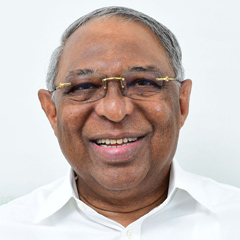Two hearts full of love

Mail This Article
(Mammen Mathew, Chief Editor of the Malayala Manorama, recalls his meeting with Pope Francis in 2015)
Pope Francis wafted gently, like a little breeze, into the blessed St Peter’s Square in the Vatican. Peaceful, too, was the popemobile, his buggy. The security men accompanying it were calm and quiet, showing no sign of sternness. Prayerful was the assemblage in the Square. A large number of them had arrived from distant parts of the world, for a glimpse of the Pope and to catch his eye.
The popemobile halted whenever it came near anyone old or infirm. He had all the time for everyone who sought his prayers and succour. The security men gently picked up the children and lifted them up for the Pope to hug and kiss. He embraced the infirm and the ailing, muttering prayers for them and blessing them.
It was Wednesday, May 13, 2015, and I had arrived in Rome with my wife, Prema, to fulfil a long-cherished wish: to have a glimpse of the Pope. The supreme leader of the Syro-Malankara Catholic Church, Cardinal Mar Baselios Cleemis Catholicos Bava, had facilitated the meeting.
On his request, Fr Kuriakose from Sultan Bathery had secured a vantage point at St Peter’s Square for us to have a close look at the Pope. The Bava had also requested the Vatican’s diplomatic representative in Delhi, Archbishop Salvatore Pennacchio, to help us meet the Pope.
My son, Jayant and his family, and my brother Philip Mathew’s son, Amit and his family were also with us.
The Pope was in no hurry as he met the people in the square. He had time for everyone. Two days later, I read in the international edition of The New York Times that he was living on one lung. The spiritual leader who was striving to save the whole world was himself ailing.
But I realised on that Wednesday that he had not only a heart, but two of them. Hearts that overflowed with divine love for humankind and shared their pain and suffering.
Our family was so lucky that we could watch the Pope from close quarters for three hours. He radiated a magnetism, and I had no doubt that he was a great being, a man of infinite peace. I would call him the Francis of Peace, Compassion, and Mercy.
He was always the people’s pope. He moved through the people in the square, smiling and comforting them. Soon, he got out of the vehicle and moved to a seat on the podium to address the people. Thousands had assembled at the vast square of St. Peter’s Basilica. His words fell on the listeners in a gentle and peaceful way.

Like him, his words had the beauty of utter simplicity. The words were untouched by any complexity of lofty ideas or high-flown language. His words were for the common people, for everyone.
Every word, I felt, had a calming, comforting ring.
The Pope said he was going to say something he had said at the square some time before. It was about three everyday phrases: May I, Thank You, and Pardon Me. The three words, he said, can work miracles at home, in family life.
These words, he said, are two cornerstones of peace. They were very simple words, but it was not easy to practise them. But once you master them, happy happenings will keep visiting your home. These words carry solutions to hundreds of problems. In their absence, cracks appear in your life, and life itself may fall through the cracks.
These are words of gentleness and humility, he said. Humility will take you half the way to divinity, he recalled the words of Bishop Francis de Sales.
Humility has to be genuine, not feigned. Guard against hollow humility, he said. Hollow humility indicates a dryness of the soul and an indifference to fellow beings.
Sometimes bad traits hide behind humility. Even religions are not exempt from this, he said. Pretended humility drowns spirituality in material entanglements.
In English, a question that starts with the words “May I” carries humility. A request is implicit in the question. It invests the question with the beauty of one’s respect for the other person, even when the person who asks the question has the right to do what he is seeking to do. Aggressiveness does not suit human beings, he said.
Some people think that saying “Thank You” is a sign of weakness. But gratitude has its high seat in every faith and principle. The expression of gratitude denotes the fine quality of a cultured mind. Gratitude flowers in the goodness of the heart.
Earnest apology is a panacea for every conflict in family life, the Pope said. Pure air cannot enter homes that shut out forgiveness. People who are unwilling to say, “Please pardon me, I was wrong,” live suffocated lives. Problems keep flooding into their homes. Let no day turn into night without forgiving all mistakes and wrongs, he said. Go to bed only after resolving quarrels with your parents and children.
The very act of seeking forgiveness will shower peace on the seeker and make life easier to live.
These are simple words and simple ideas. You may dismiss them with a mocking smile. But if you forget them, life will cease to be a simple matter, he concluded.
As the Pope rose from his chair, there was nary a sign that he had uttered something profound. He got back to the square, once again to be in the midst of people from far-off places. Many of them were troubled by illness, old age and mental unrest. He moved among them with a smile on his face, prayers on his lips and blessings at his fingertips.
He moved towards a spot reserved for differently abled people. He spoke with each of them, comforted them and spent ample time with them. He did not ignore anyone, despite his hectic schedule. Yes, while bearing the cares and worries of a world leader, he had no time for haste or impatience.
Clearly, everyone was dear to him, and he did not discriminate. He never asked about their religion or creed. Such differences become insignificant in his holy presence.
Soon, he was meeting with cardinals, bishops and papal envoys who had arrived on official visits. Later, he came to the spot where Prema and I sat. A woman who sat next to me had brought a photograph of her grandchildren and prayed that the Pope bless them. Touching the photograph, he prayed for the children and then kissed the picture, unasked. Tears of joy flowed down the grandmother’s face.
With reverence, Prema and I kissed the Pope’s hand. I implored him to pray for my country, my coworkers and my family. I told him about the sufferings of my ailing friends and their children. I had noted down the details on my visiting card under the Malayala Manorama emblem. He gracefully accepted the card and put it in his pocket.
His assistants gave us two rosaries. We would give the rosaries to our grandchildren to be kept as a priceless treasure forever.
Days of the pontiff are always hectic. Yet he spent a lot of time at the square on that Wednesday. He had spent the previous day with the president of communist Cuba, Raul Castro. It was Pope Francis who initiated the revival of diplomatic relations between Cuba and the United States of America.
After the meeting, Raul Castro said at the press conference: ‘I met Pope Francis and told him that I always listen to his speeches and advice. I listen to them carefully. They are so meaningful and truthful. Even though I am a communist, I am thinking of allowing churches in Cuba. I will surely consider giving religion its rightful place in Cuba.’
It was while we were in Rome that the Vatican officially recognised the state of Palestine. Yes, the Pope was lightning quick in making decisions relating to nations. Yet he was ready to spend any amount of time for the suffering human beings.
The number of Christians in Europe and America has dwindled over the years, but there has been no thinning of the flow of pilgrims to the Pope. Someone asked Pope Francis about the secret of his cheerfulness, and he replied: ‘Give your busy schedules frequent holidays. Live and let live. Yearn for peace and work for it. Do only what is good for human dignity. Shun negative thoughts. Enjoy art and literature. Relax your mind and pass gently through your life.’
We kept our gaze on him as the Pope floated out of St Peter’s Square like a silent prayer.


